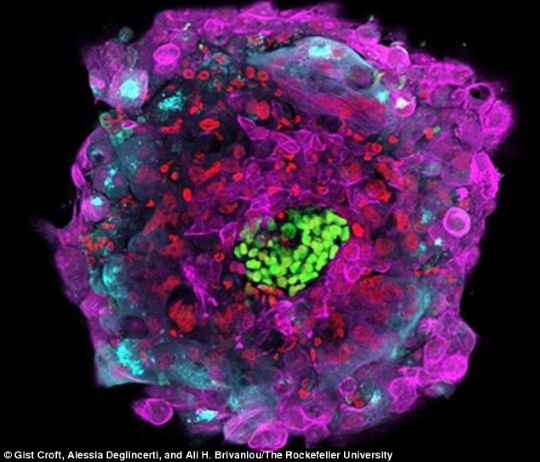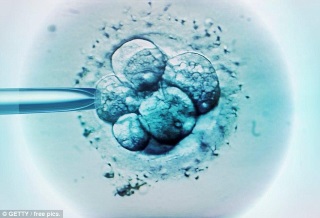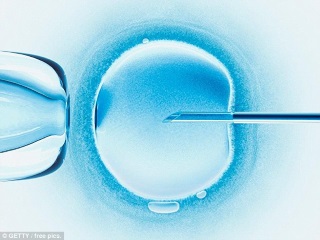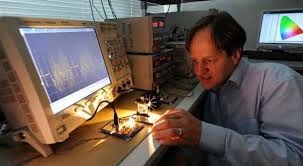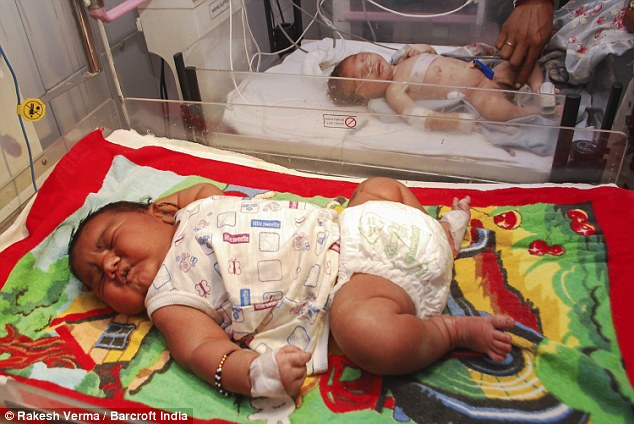Human Embryos Grown in A Lab Dish for 13 DAYS
Scientists have kept a human embryo growing in a laboratory for nearly a fortnight in a controversial breakthrough that could help childless couples.
The advance means existing technology is capable of developing eggs for longer than the internationally accepted legal limit of 14 days. It raises hopes for better IVF treatments – but would generate huge ethical questions. Until now no human embryo has been successfully grown outside a mother’s body for longer than six days. On the seventh day, the developing egg needs to implant itself into a womb to keep on growing. But now scientists from Cambridge University and Rockefeller University in New York have managed to get the embryo to ‘implant’ itself in a soup of chemicals in a laboratory dish and grow for 13 days. Researchers yesterday called for a public debate about whether it is socially acceptable to allow scientists to grow embryos for a longer period – possibly up to a further week. Magdalena Zernicka-Goetz, professor of mammalian development and stem cell biology at Cambridge, said the advance gave experts a unique understanding of how a developing egg grows into a human. ‘This is the black box of development which we have never been able to look into before,’ she said.
Prof Zernicka-Goetz said her team’s research was particularly important because the implantation stage was ‘one of the major causes of early pregnancy loss’. The failure rate in IVF at implantation is up to 70 per cent, but it is impossible to carry out studies into what causes this on embryos developing in the womb. The embryos used for the breakthrough research were donated by couples undergoing IVF treatment. They were developed in a growth medium that had previously been used with mouse embryos. The lab-grown eggs did not develop entirely the same as one in the womb. Because it was grown in a flat environment, the embryo was more two-dimensional. The research, which took six years to complete, is also expected to help understand embryo ‘malformations’ that can lead to early pregnancy loss as well as helping to grow better stem cells. At around 14 days the embryo begins ‘gastrulation’, when it develops layers that will go on to become the skin, muscles, spine, brain and internal organs. Prof Zernicka-Goetz said the findings – published in the journals Nature and Cell Biology – raises ethical questions about breaking through the 14-day limit. She said ‘a few more days’ would help, adding: ‘I think longer cultures could provide absolutely critical information for basic biology, it can improve IVF success and improve stem cell differentiation.’ Aldous Huxley’s 1931 novel Brave New World depicted a nightmare scenario where babies were grown in laboratories. But Prof Zernicka-Goetz insisted we are ‘extremely far’ away from growing a whole baby outside a womb, adding: ‘That’s science fiction’. The academic said she was inspired to carry out her research after giving birth to a healthy boy at 44 – despite a test that showed there was a high chance her child might have a rare genetic disease. The breakthrough increases pressure to relax the law on conducting experiments on human embryos, enshrined in the 1990 Human Fertilisation and Embryology Act.
Independent policy advisers the Nuffield Council on Bioethics now plans to review its position on the law. Experts were last night divided on the issue of developing embryos beyond 14 days. Dr Robin Lovell-Badge, of the Francis Crick Institute in London, said an extra two days to a week might be useful to researchers, but said it was a matter for wider society to decide. Professor Harry Moore, professor of reproductive biology at Sheffield University, said it could help treat conditions of pregnancy such as recurrent miscarriage and pre-eclampsia. But Peter Braude, emeritus professor of obstetrics and gynaecology at King’s College London, said much information has already been gathered using stem cells. And Henry Greely, of the Stanford School of Medicine, said: ‘I do not see a politically, or, for most people, morally acceptable line after 14 days.’ Written By Colin Fernandez Retrieved From:
|
|





